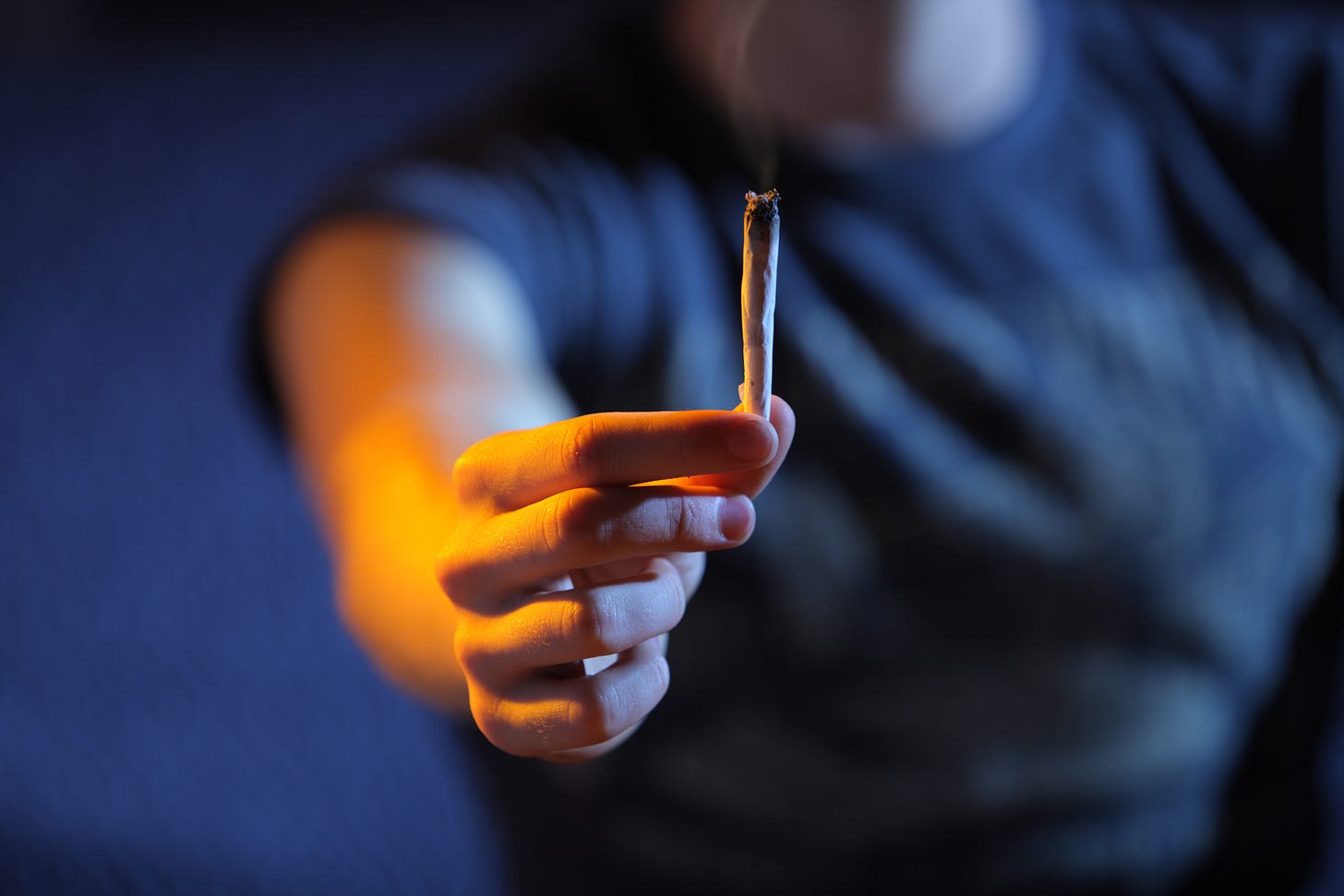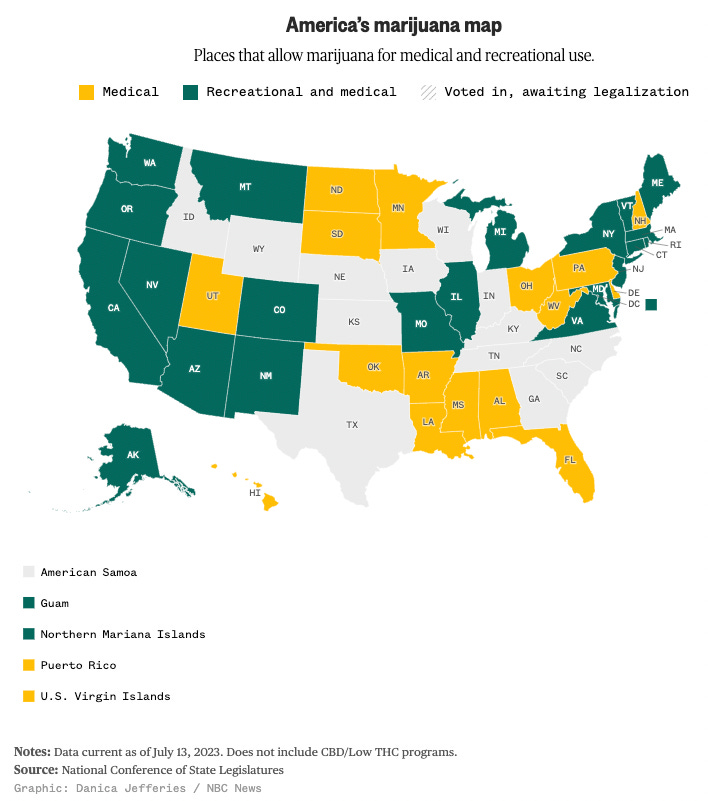Let's Talk About Cannabis
It’s the drug some teen addiction researchers are most scared of.
A couple of weeks ago I ran a Q&A here with neuroscientist Danielle Dick, who directs the Rutgers Addiction Research Center. We discussed what the science says about preventing alcohol misuse in teens. While we were chatting, Dr. Dick said something that rather freaked me out about kids and marijuana. She said:
That's honestly the thing that those of us who study substance use and adolescents are most worried about. Right now it's the opioid epidemic, but in a decade, it's going to be the cannabis crisis, and it's all going to be our kids.
After she explained her rationale, I felt the conversation deserved its own newsletter. There’s some nuance here, which I was grateful to see as someone who enjoys the occasional edible — she’s not saying that teens (or adults) who experiment with marijuana are doomed, but rather that the shifting culture and legal framework surrounding the drug, and the drastic ways the drug itself has changed, have worrying implications that parents need to be aware of. Here’s our conversation, which has been lightly edited for length and clarity.
Okay, Danielle — talk to me why you and your colleagues are so worried about cannabis.
Part of the reason that we are so concerned is because legalization has swept the nation such that in the majority of states, some form of cannabis is legal, whether it is medicinal or recreational. Legalization has created two big things, which is increased acceptance and increased availability. And we know that those two things are the biggest things that contribute to whether or not kids use a substance — and whether or not kids who are carrying some of those risky risk factors that we were talking about before [with alcohol] are likely to develop problems.
On the college scene — things tend to happen first there — there have been rising rates of cannabis use. A high percentage of kids — it's something like 45 percent of college seniors — now say that they've tried cannabis, and close to ten percent are saying that they use daily. It is far easier to use cannabis daily and to still go about functioning in your life — functioning in quotes — than it is to be, say, drinking daily. Alcohol is heavier, it’s harder to hide; you can smell it. You can tell if a kid is drunk in your class. It's far harder to tell if they're sitting there and they're high in your class. You can also put THC, the active ingredient in cannabis, in vape pens and e-cigarettes.
There is also growing acceptance. [People think] “Well, gosh, it's legal. It can't be dangerous, right?” Often what we see is parents, too, who think, “Oh, this is no big deal — better than drinking.” My friends who are ER doctors, this is what we talk about at cocktail parties: The number of kids that they are seeing coming in with cannabis-induced vomiting and psychosis. Often, they're getting it or using it with their parents who think it's not a big deal.
So why is it such a big deal?
The cannabis of today is a totally different drug than it was just a couple of decades ago. THC is the active ingredient. That's what gives it its psychoactive properties. And in the 70s, 80s, and 90s up through the early 2000s, the active level on average was about three percent THC. A very mild drug, if you will.
As states started to legalize, they had are growers who could legally start experimenting with crossing plants, trying new strains and putting those on the market. And guess what happened? They were creating stronger and stronger strains. And they were selling better and better because people weren't necessarily trying to select for a more potent drug but they were like, “Hey, this is great.” So we saw THC levels climb, to now, on average, about 25 percent. Eight times stronger than the marijuana of our youth. It is a completely different drug. And not only that, but edibles are 80 to 90 percent active THC.
Wow.
And because legalization happened so much faster than any of the research, we don't have hardly any good research on long-term effects — what it does to developing brains. What is coming out suggests that, like with alcohol, there are particularly potent adverse effects on developing brains. Especially when talking at the level of daily use — in the same way that if a kid tries a beer here or there or goes out and gets drunk once, it's not like they have destroyed their brain. The same thing is true with THC — kids are probably going to experiment, and it’s not great for their brains, but it's not horrible.
But when they're using on a regular basis — and we see this growing number of kids who are — then it appears that there's pretty profound effects on memory and motivation. Those are the two big things that are affected. And when you think about what are kids’ jobs — to get themselves up to go to school, to get good grades — when your memory and motivation now are shot, you're not going to class, not doing well.
The sad thing about the drug is because it affects motivation, you don't even care, either. So we find it very hard to treat these kids or get them to care about wanting to do better. This is why we are so worried.
Why don’t we know more about cannabis’s effects on the developing brain?
It’s very hard to study as a schedule I drug. You can only obtain the drug for study from a couple of labs around the country that are government approved. And guess what they have been producing? Extremely low level potency marijuana that has no correlation with this high potency stuff that kids are actually using. So it's been very hard to do marijuana research because you have to apply for all these special permissions and have all these things in place to be able to work with schedule I drugs, and you're not even getting the potent stuff that kids and adults are actually using.
That's crazy. I had no idea that you couldn’t get the new stuff to study.
It's really scary.
So what do we do? I'm guessing some of the same things we talked about with alcohol would be true with cannabis — setting rules, having conversations, not normalizing its use with kids? What are the things you really emphasize?
Yeah, it's virtually identical. You want to have conversations with your kids, and you want to have rules surrounding it. I always think about being armed with the facts. I know as a science journalist you share this belief — being armed with the facts can help parents make the best decisions for themselves and their families.
Yes, absolutely.
We know that adolescents tend to not like rules. They push back about rules. So I find it very helpful to sort of have the facts in my back pocket as the “This is why there are the rules. Because my job is to keep you safe, and to help you grow up. And the reality is that these these drugs — meaning alcohol and cannabis and other drugs — these are things that are harmful, and they're particularly harmful for adolescents. That's why the rules in our house are that you're not to use them until you're 21. And then you can legally make those decisions for yourself.”
Related posts:






This is an interesting conversation. The way legalization (and the changing composition of the drug) will affect kids and teens is not something I had put much thought into. I do think even comparing cannabis with opioids is ridiculous and turned me off from the conversation initially however. I am in public health and think honesty and messaging are important. Cannabis needs to be given the respect it deserves but it is not an opioid.
Excellent post! I'm an addiction and maternal mental health therapist and the biggest way I see cannabis impacting kids right now is their PARENT'S use! Which is turning into a total nightmare. So many parents escalating to daily use, triggering mania of previously mild of unknown cyclical disorders, driving under the influence, and divorce. And don't even get me started on the disaster of accidental ingestion, such a mess. Glad these conversations are happening.